
Cash on Delivery in Indian Dropshipping: Should You Offer It?
In India, Cash on Delivery (COD) isn’t just a payment option—it’s a trust-building tool. Even in 2025, while much of the world embraces seamless digital transactions, a large segment of Indian consumers still feels more secure paying in cash, once the product is in their hands.
But here’s the catch: when you’re running a dropshipping business—especially if you work with a clothing dropship vendor for Indian sellers—offering COD isn’t as simple as flipping a switch.
In this article, we’ll explore whether Cash on Delivery in Indian dropshipping is a smart move or a ticking time bomb. From benefits and hidden pitfalls to expert tips on managing COD effectively, this is your go-to guide before making the call.
Why COD Matters in the Indian Market
India is a unique eCommerce ecosystem. Despite increasing adoption of UPI and digital wallets, a huge percentage of online shoppers still trust COD as their go-to payment option. When you’re building a COD-enabled store, your platform matters just as much as your payment strategy—especially if you’re learning how to start dropshipping on Shopify in India with the right checkout and COD controls.
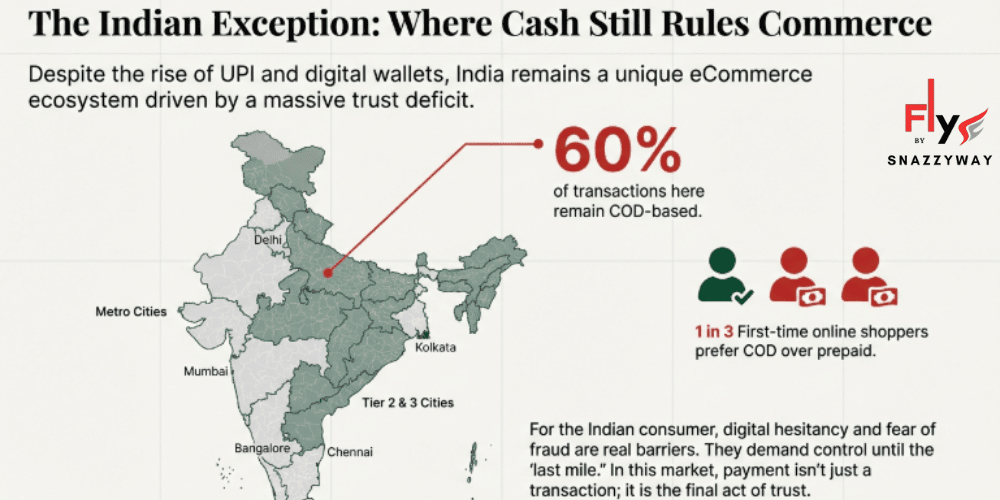
Key Stats:
Over 60% of online transactions in tier 2 and 3 cities are still COD-based.
1 in 3 first-time online shoppers prefer COD over prepaid methods.
Trust, lack of digital literacy, and fear of fraud are the main reasons behind this behavior.
For a new or small dropshipping store, especially one trying to build trust, offering COD can significantly increase conversions.
🔍 Snazzyway Insight: What 12+ Years in Indian COD Actually Taught Us
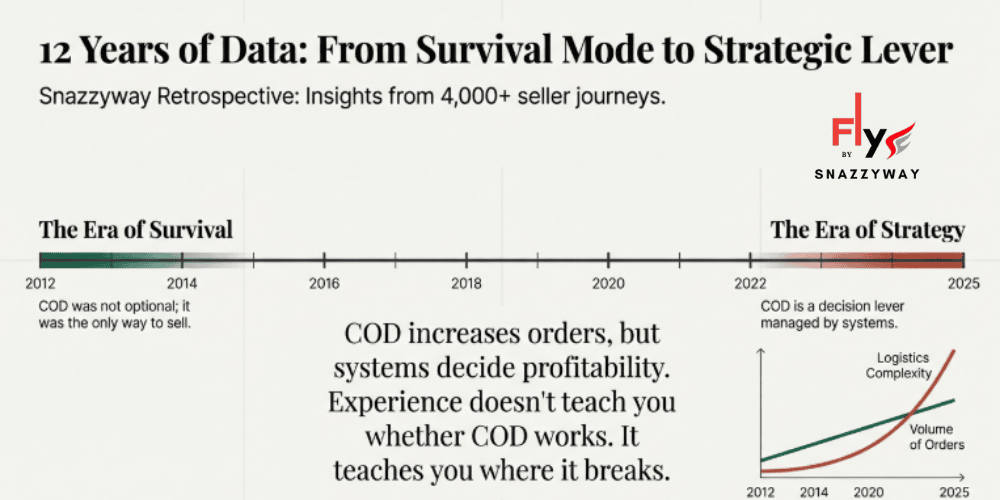
At Snazzyway, we’ve watched Cash on Delivery evolve from a necessity to a decision lever.
When we started over a decade ago, COD wasn’t optional — it was survival. Digital payments were limited, trust in online shopping was low, and customers wanted control till the last mile.
Fast-forward to today, after working with 4,000+ sellers, one pattern is clear: r—COD increases orders, but systems decide profitability. That’s why understanding how Snazzyway’s dropshipping system works is critical before enabling COD at scale.
COD increases orders, but systems decide profitability.
Sellers who treat COD as a blanket option often struggle with returns and cash flow. Sellers who treat COD as a controlled experiment — limited to specific pin codes, order values, and product categories — consistently outperform the rest.
Experience doesn’t teach you whether COD works.
It teaches you where it breaks.
The Pros of Offering Cash on Delivery in Indian Dropshipping
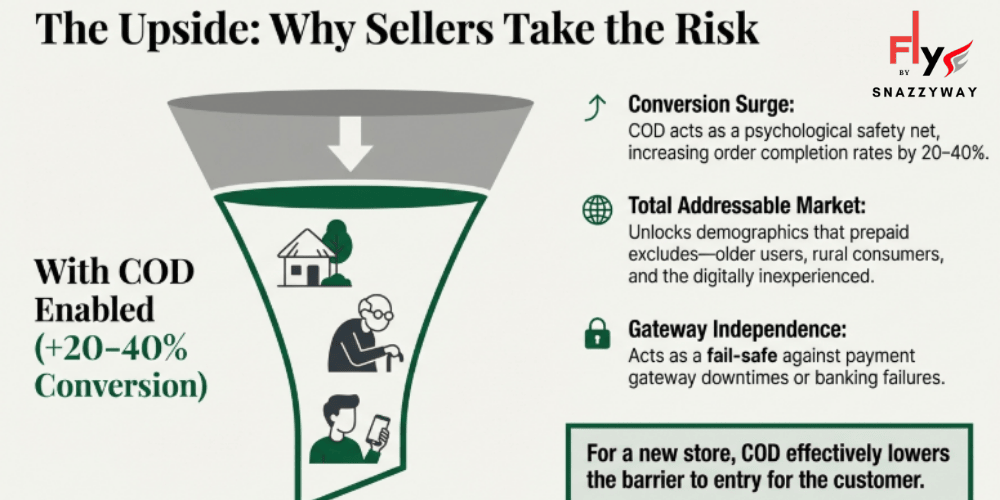
1. Higher Conversion Rates
Customers are more likely to complete a purchase when they don’t have to prepay, especially if they’re new to your store.
Fact: COD can increase order completion rates by 20–40%, particularly in non-metro areas.
2. Builds Trust
Most Indian shoppers are wary of scams or poor-quality products. COD gives them a psychological safety net—they pay only when they receive the product.
3. Wider Audience Reach
By offering COD, you tap into a massive audience that prefers cash transactions—including older users, rural consumers, and smartphone users with limited digital payment experience.
4. No Payment Gateway Dependency
If your payment gateway faces downtime or fails to support Indian banks or wallets properly, COD becomes a solid fallback. That’s why choosing from the best payment gateways for Shopify dropshipping in India is just as important as offering COD.
⚠️ The Side of COD Most Blogs Don’t Talk About
Most COD discussions focus on conversion. Very few talk about operational pressure.
Here’s the uncomfortable truth we’ve seen repeatedly:
COD orders need more follow-ups
Delivery success depends on customer intent, not checkout intent
Growth looks good on dashboards — but profits lag behind
Many new dropshippers mistake more orders for better business. In reality, unchecked COD can quietly drain margins through small, repeated losses that only show up months later.
That’s why COD feels powerful early — and painful at scale.
The Hidden Challenges of Cash on Delivery in Indian Dropshipping
Despite its appeal, COD isn’t all sunshine and high sales. Here are the key pitfalls that can crush your profits if not managed wisely.
1. High Return-to-Origin (RTO) Rates
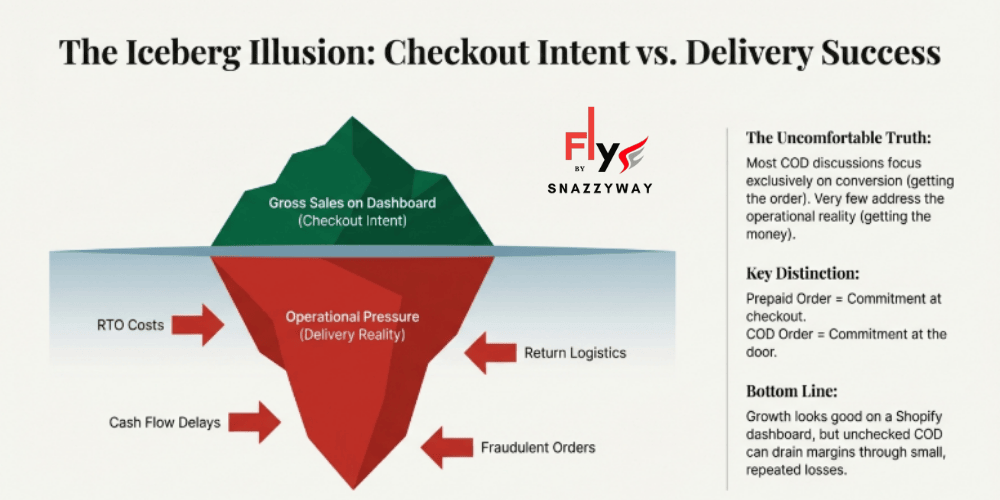
This is the biggest pain point. In COD orders, customers often refuse to accept the package, leading to:
Wasted shipping costs
Product loss or damage in return transit
Additional handling and reshipping efforts
RTO rates for COD orders can be as high as 30–40%.
COD works very differently on marketplaces, and sellers exploring how to dropship on Amazon in India must account for stricter logistics, higher penalties, and limited control compared to their own store.
2. Increased Operational Costs
You have to pay the shipping provider extra to handle cash, plus you bear the cost of RTO and failed delivery attempts. These charges eat heavily into already-thin dropshipping margins.
3. Complex Cash Flow
Cash collection delays affect liquidity. Courier partners may take 7–15 days to settle COD payments. For dropshippers working with slim capital, this can choke reinvestment cycles.
4. Fraud and Fake Orders
Some buyers misuse COD for pranks or impulsive purchases. They might place an order and refuse it later, knowing there’s no prepaid commitment.
🚫 Why COD Stops Working After a Point
COD is excellent for first-time buyers.
It’s inefficient for repeat buyers.
Once a brand starts getting consistent traffic, social proof, and returning customers, COD begins to create friction instead of trust.
We’ve seen sellers hit a ceiling where:
Ad spend increases
Order volume rises
But net profit stays flat
In almost every case, excessive COD dependence was part of the problem.
Growth requires predictable cash flow. COD introduces unpredictability.
Should You Offer COD in Your Dropshipping Store?
There’s no one-size-fits-all answer. It depends on:
| Criteria | COD Recommended? |
|---|---|
| New Store | ✅ Yes (build trust) |
| High-ticket items | ❌ No (high RTO cost) |
| Fashion or impulse categories | ⚠️ Maybe (test with caution) |
| Repeat customer base | ❌ Less need for COD |
| Tier 2 & 3 city focus | ✅ Strongly recommended |
| Razor-thin profit margins | ❌ No, risk is high |
Best Practices for Managing COD in Indian Dropshipping
If you decide to offer COD, here are smart ways to minimize its risks:
1. Add COD Charges
Charge a small fee (e.g., ₹49–₹99) to discourage casual buyers and cover RTO costs.
2. Enable COD for Select Products Only
Avoid offering COD on high-value or high-return items like lingerie, electronics, or custom products.
3. Implement Order Verification
Use OTP confirmation or WhatsApp follow-ups to validate orders before shipping.
4. Partner With COD-Friendly Dropshipping Suppliers
To offer Cash on Delivery in Indian dropshipping, work with clothing Dropshipping suppliers who support COD logistics. Look for fast shipping, branded packaging, and RTO management.
5. Track RTO Analytics
Monitor your RTO data by:
Product category
Region
Order value
This helps you optimize what items should or shouldn’t be sold via COD.
6. Use “COD Available” As a Marketing Hook
Highlighting COD availability in ads or product pages can boost CTR and conversions—especially in Facebook or Instagram ads targeting Bharat audiences.
What Successful Indian Dropshippers Are Doing
Many Indian dropshipping brands take a hybrid approach:
They offer COD + Prepaid options.
They incentivize prepaid by offering discounts (e.g., “Get ₹50 off on prepaid orders”).
They limit COD to repeat-verified customers or use it only during launch periods to build initial traction.
Dropshippers working with white-label partners like Snazzyway have additional advantages because they can add custom packaging and brand labels—this improves trust and reduces COD-related cancellations.
💡 How Smart Sellers Use COD (Without Letting It Control Them)
From thousands of seller journeys, the best performers follow a simple rule:
COD is an entry door, not the main hall.
They:
Offer COD selectively, not universally
Push prepaid incentives after the first successful delivery
Track COD performance weekly, not emotionally
Remove COD faster than they add it
This mindset shift — from “COD = more trust” to “COD = temporary leverage” — is what separates sustainable brands from short-term stores.
Conclusion: To COD or Not to COD?
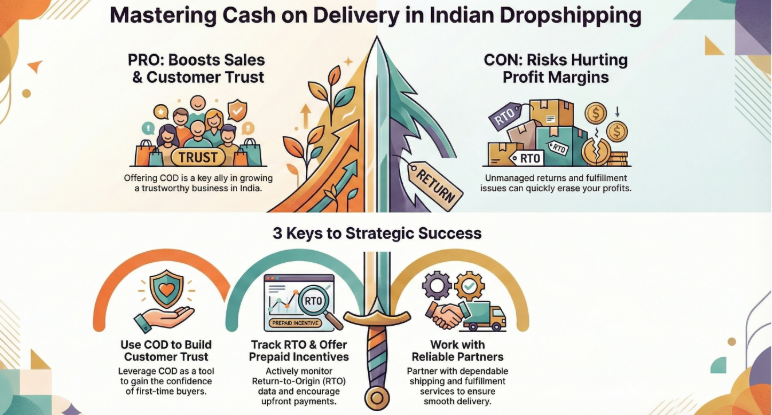
Offering Cash on Delivery in Indian dropshipping is a double-edged sword. While it can boost your sales and customer trust, it also comes with risks that can hurt your profit margins if left unmanaged.
The key is to approach COD strategically:
Use it to build trust.
Track and optimize RTO data.
Combine it with prepaid incentives.
Work with reliable shipping and fulfillment partners.
If you play your cards right, COD can be your best ally in growing a trustworthy and scalable dropshipping business in the Indian market.
🧠 Final Snazzyway Perspective
COD isn’t good or bad.
It’s situational.
For new sellers, it builds confidence.
For growing sellers, it demands discipline.
For scaled brands, it’s often optional.
After 12+ years in Indian eCommerce, one thing is consistent:
The sellers who last the longest are not the ones who sell the most —
they’re the ones who control how they get paid.
Cash on Delivery (COD) is a payment option where customers pay for their order at the time of delivery instead of paying online in advance. It helps build trust, especially in markets where online payment adoption is lower
COD is popular in India because many customers still prefer paying only after seeing the product. Offering COD can help you increase conversions, especially among first-time online buyers and in tier-2 and tier-3 cities.
Yes — studies show COD can significantly increase order completion rates because customers are more willing to place orders when they don’t have to pay upfront
COD can drive sales, but it also eats into profit margins because of extra logistics costs and RTO losses. You need to balance increased sales with the costs associated with handling COD orders
For new stores looking to build trust quickly, offering COD — at least initially — can help attract cautious buyers who might otherwise abandon cart before paying
